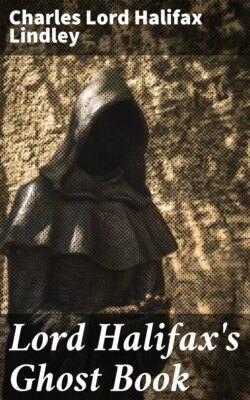Читать книгу Lord Halifax's Ghost Book - Charles Lord Halifax Lindley - Страница 3
На сайте Литреса книга снята с продажи.
FOREWORD
ОглавлениеTable of Contents
As long as I can remember, my father's Ghost Book was one of the most distinctive associations of Hickleton. He kept it always with great care himself, from time to time making additions to it in his own hand-writing, and bringing it out on special occasions such as Christmas to read some of the particular favourites aloud before we all went to bed. Many is the time that after such an evening we children would hurry upstairs, feeling that the distance between the Library and our nurseries, dimly lit by oil lamps and full of shadows, was a danger area where we would not willingly go alone, and where it was unsafe to dawdle.
Such treatment of young nerves, even in those days, would not have been everybody's prescription; and I well recollect my mother protesting—though I believe almost invariably to no effect—against 'the children being frightened too much'. My father, however, used to justify the method as calculated to stimulate the imagination, and the victims themselves, fascinated and spell-bound by a sense of delicious terror, never failed to ask for more.
I have often wondered what really underlay the attraction that Ghost stories and the like held for my father, leading them to fill so not inconsiderable a place in the background of all our life with him as children. They appealed strongly to his natural sense of mystery and romance, which so largely dictated his scale of values in the appraisement of persons and things. Apart from the moralities, few charges in his eyes were more damaging to persons than that they should be judged devoid of imagination, and the actual framework of everyday life had value according as it corresponded to something more profound than itself, to be felt rather than seen, and to be apprehended only by some faculty more subtle than that of reason.
And I cannot doubt that the true secret of the appeal made to his thought by the mysterious, or so-called uncanny, was the glimpse that such narratives or events might seem to afford of the hidden realities of the unseen world. The story which he wrote himself and which appears at the end of this book under the title of 'Colonel P.'s Ghost Story', begins as follows: 'Where are the dead—those who have loved us and whom we have loved; and those to whom we may have done some irreparable injury? Are they gone from us for ever, or do they return? Are they still amongst us, possessed of that undefined, mysterious, and awful existence which the ancient world attributed to the ghosts of the departed?... Between this world and that other which escapes our senses, we can neither explain the connecting link, nor admit an impassable barrier.'
Thus mystery, romance, adventure, other-worldliness, all played their part; and since these stories are thought worthy of presentation to a wider public, I hope that they may be the means of making known another aspect of the many-sided personality of their collector, and reproduce for their readers some of the interest that they held for him.
HALIFAX
June 1936
